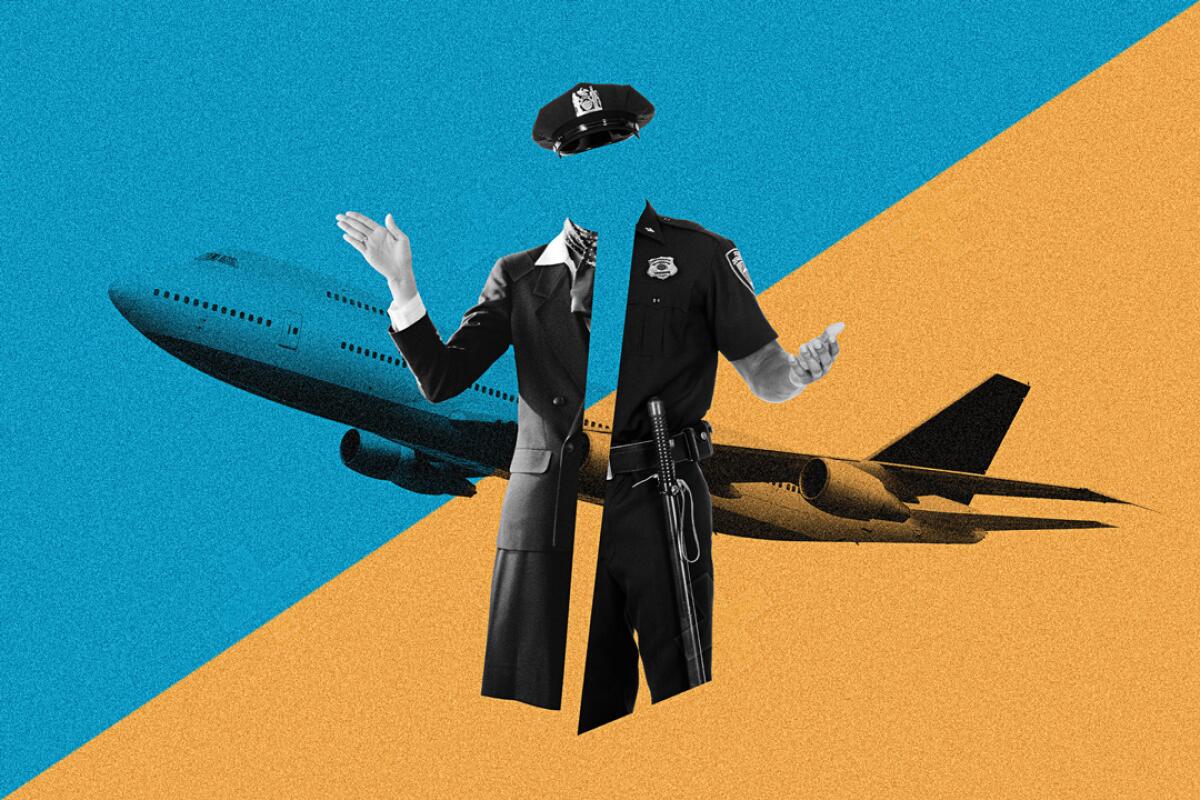When flight attendants become mask cops, the noncompliant can get grounded

- Share via
Since July 29, 2020, when the airline I work for began requiring face coverings for passengers on all flights, flight attendants have been tasked with the role of in-flight enforcer. If a passenger lowers her mask to eat or drink and forgets to raise the mask afterward, if he allows the mask to slip from his face (even while sleeping), lowers the mask to talk with seatmates or purposely removes the mask and refuses to put it on again, we are forced to take appropriate action.
At my airline — one of the world’s largest — flight attendants are required to give a “verbal reminder” to maskless passengers. I have issued dozens, if not hundreds, of verbal reminders since the mask policy began, so I can tell you the vast majority of passengers comply promptly, if not apologetically.
The need for face coverings is not lost on reasonable flyers, who understand that the mask mandate was issued to help prevent the spread of COVID-19 on an airplane (where social distancing is physically impossible). Nevertheless, as is the case in the air and on the ground, some folks are not reasonable.
I have been glared at, scoffed at, derided and ignored while issuing verbal reminders, Still, most who respond in this manner rise above their objections and put on the mask. But every once in a while a passenger refuses.
Although flight attendants are responsible for approaching maskless passengers, we often do so at the behest of a fellow passenger who witnessed the transgression. On many occasions I’ve been approached by someone who whispered, “The guy in 22D isn’t wearing a mask,” or “Will you please tell the woman sitting next to me to put on her damn mask?”
Most passengers are unwilling to confront their fellow travelers and prefer to have a flight attendant deal with the problem. That’s an understandable and even preferred course of action. Letting a uniformed airline representative handle the conflict often reduces the chance that it will turn ugly.
So when someone commits a mask infraction, be it accidentally or on purpose, a flight attendant will approach. If the passenger complies, all is well. But if she or he refuses, a second crew member will try to impress upon the passenger the need for mask compliance.
Once we’ve made at least three unsuccessful attempts, preferably by three different crew members (so that the passenger doesn’t feel besieged by one particular employee), the captain must be notified.
If the plane is at the departure gate during the noncompliance event, a customer service agent will board and give the maskless passenger an ultimatum: Wear the mask or be escorted from the aircraft.
Since the mask policy began, more than 3,000 noncompliant passengers have been banned by U.S. carriers. Recently, while working a flight from Miami to Saõ Paulo, Brazil, my crew was forced to remove one such passenger.
As mandated by the airline, the passenger wore a mask while boarding the aircraft. But after claiming his seat in the main cabin, the man inexplicably removed his mask. Concerned passengers alerted flight attendants. We issued three verbal reminders to the noncompliant passenger. Each time he refused to comply.
The gate agent boarded the aircraft and issued the ultimatum. Moments later, after ignoring the agent’s pleas, the passenger was removed from the aircraft.
Our flight left for Saõ Paulo without him.
When a mask issue occurs after takeoff, the crew’s options can be more complicated. Depending on the severity of the conflict, the captain may decide to divert the flight in order to remove the problem passenger. This is precisely what happened Sept. 15 on a United Airlines flight from Newark, N.J., to Las Vegas.
According to news reports, a male passenger became disruptive while refusing to comply with the airline’s face-covering policy. As a result, the flight diverted to Omaha. The plane was met by law enforcement officers who escorted the passenger off the aircraft. Approximately 30 minutes later the flight took off and flew on to Las Vegas.
Until recently, the most severe punishment for a noncompliant passenger was his or her removal from the aircraft and a temporary ban from flights. But now the Transportation Security Agency will implement President Biden’s executive order requiring travelers to wear face coverings in airports and on commercial flights. Failure to do so can result in fines from $250 to $1,500 or more, depending the severity of the transgression. (Children younger than 2 are exempt.)
Scarves, bandannas, ski masks and balaclavas are not allowed. Neither are face masks with slits, exhalation valves or punctures. Passengers with disabilities who are unable to wear a mask must show proof of a negative COVID-19 test taken within 72 hours of departure or proof of recovery from COVID-19.
Flight attendants are not cops, though we’re occasionally put in a position to act like one. During my 35-year career, I’ve broken up fistfights, wrestled assailants to the aircraft floor and applied flex cuffs to more than one out-of-control passenger.
Giving verbal reminders to maskless passengers has become a necessary part of the job. No longer do we cite “airline policy” as a reason to comply, however.
Noncompliant passengers are now breaking the law.
More to Read
Sign up for The Wild
We’ll help you find the best places to hike, bike and run, as well as the perfect silent spots for meditation and yoga.
You may occasionally receive promotional content from the Los Angeles Times.






